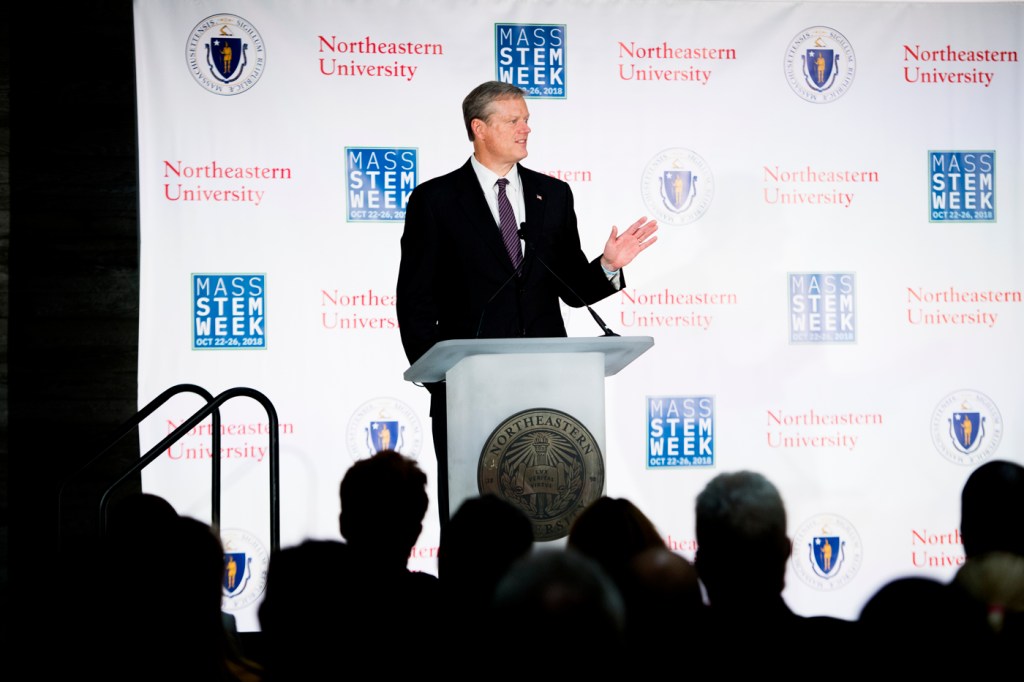Massachusetts’ anti-Trump GOP governor is leaving office more popular with Democrats

Massachusetts Gov. Charlie Baker is a political rarity—a moderate Republican in a deep blue state with stronger approval ratings from Democrats than from his own party, according to a U.S. study by the Covid States Project, a collaborative effort by researchers from Northeastern, Harvard, Northwestern, and Rutgers.
Baker’s decision not to seek a third term shook the state’s political establishment and threw the doors wide open on a successor. Had he stayed in the race, he would have faced a Republican backed by former president Donald Trump. That could have meant a tough campaign, given the rightward shift of state Republicans.
Baker denied Trump’s influence played a role in his decision—“No, not at all,” he told reporters. Rather, he plans to focus the remainder of his time in office to the pandemic recovery.

Baker, a Republican, enjoys rock solid support from 54% of Massachusetts residents, but they’re mostly Democrats. ‘That’s bizarre,’ says David Lazer, university distinguished professor of political science and computer science. Photo by Adam Glanzman/Northeastern University
“We believe it’s most important that we spend the next year focusing on that and not focusing on, let’s call it, the discourse—that’s probably an insult to the word discourse—that comes with political campaigning,” the governor told reporters.
Still, among Massachusettsans who voted for Trump last year, just 38% threw their support behind Baker, researchers found. Among a broader swath of state residents, however, Baker enjoys strong support from 54% of them, according to the survey of almost 500 people.
That 54% was head and shoulders above the 42% average gubernatorial job approval rating across the country, but it was largely fueled by Democrats in the Bay State; 64% of them approve of Baker, compared to just 35% of Republicans.
“Having twice as much approval among those of the opposite party as your own is bizarre, especially in these politically polarized times,” says David Lazer, a university distinguished professor of political science and computer science, and one of the study’s authors.
When it comes to handling the pandemic, Baker again receives higher marks than the national average (58% vs. 45%), but that was well down from the 80% he enjoyed in April 2020. The sharp decline came mostly from dissatisfied Republicans.
Baker criticized Trump’s handling of the pandemic and also supported Trump’s second impeachment. But Trump hit back, saying Baker “shouldn’t even be considered a Republican,” and disparagingly referring to him as a “RINO”—Republican In Name Only.
Massachusetts has roughly three times as many registered Democrats as Republicans, but voters have elected just one Democratic governor, Deval Patrick, in the last 30 years.
“Republicans have dominated the governor’s office,” says Lazer. “There’s only been one Democratic governor since Michael Dukakis,” he adds, referring to the state’s chief executive from 1983 to 1991, who later joined Northeastern’s faculty. Dukakis retired as a distinguished professor emeritus of political science.
It may be harder for Republicans to replicate their success winning the governor’s mansion in future elections if Baker is considered too moderate for the party. “It’s an interesting puzzle,” says Lazer.
Baker’s withdrawal from the governor’s race highlights the challenge Republicans face in nominating candidates in left-leaning states who are open to electing GOP governors, researchers found.
Maryland’s chief executive, Larry Hogan, a moderate like Baker, showed that middle-of-the-road politics could give a Republican a leg up in blue states. Hogan was re-elected in 2018, becoming just the second Republican to be elected to two terms as governor in Maryland’s history. Hogan is term-limited from running a third time.
“It’s not completely out of the realm of possibility that these moderate Republicans will stick around a while longer,” explains Alauna Safarpour, a postdoctoral researcher who worked with Lazer on the study. “But we’ve seen a real hollowing out of moderate Republicans in Congress, and Baker is showing that trend in the states as well.”
Indeed, Massachusetts is “exhibit A” in the shifting political winds of the national GOP, researchers say.
“When historians look back at this era, Mitt Romney getting elected the governor of Massachusetts and then getting the presidential nomination for the Republican Party will be seen as such a weird historical anomaly,” Lazer says.
For media inquiries, please contact media@northeastern.edu.





